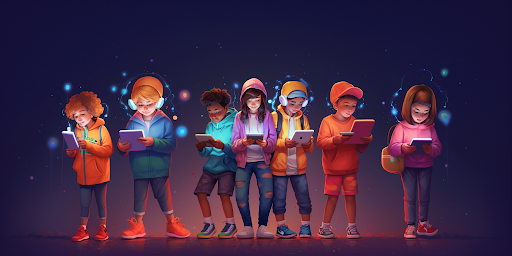The Ethics of Social Media Use By Children

COVID-19 forced us all to turn online for work, school, and social needs. Over the course of 2020 the concepts of screen fatigue and burnout became ubiquitous due to the social restraints of COVID-19, and it is hard to imagine that this is in no way connected with the uptick in the unyielding presence of social media. Smartphones have made the internet portable, and with that we have the ability to connect with others and access all of the information in the world in our back pockets. This also means that the reach of school and work extends beyond campuses and office buildings as work and school emails can now follow us home. Moreover, there is a bottomless well of content just waiting for us; there are more movies and T.V. shows that could be streamed in a lifetime across more streaming services than you can count on two hands, and that doesn’t even take YouTube into account. It is easy to lose yourself scrolling through TikTok, Twitter, or Instagram for hours at a time if you are not mindful of your consumption.
However, social media is not just for consuming content, it also allows us to create content with which others can interact. We are able to broadcast our thoughts in an instant, whether or not we have taken the time to reflect on what we are publishing for the world to see.
The necessity of self-regulating social media intake and what is posted online becomes more acute when discussing the use of social media among children. Use of social media platforms has become an integral part of childhood socialization, and that presents its own unique ethical challenges and questions. Complete abstinence from these platforms means cutting off an entire avenue of social interaction, but unfettered access to social media platforms has its own risks, which begs the question: how might ethics guide us in thinking about children’s online presence and access?
Discussion Questions
- How do you think social media will affect the children of this generation as they grow up? Do the pros outweigh the cons?
- What do you think about parents who monitor their kids’ social media and messages? Is this ethically beneficial for the kids or is it a problematic invasion of privacy? Why?
- Would you consider social media to be addictive? Why/why not? How much time on social media per week/day would you consider healthy for a kid? How long do you spend on your phone daily?
- What age or maturity level do you feel is appropriate to start using social media?
- What are some risks that children may come across when using social media?
- What are some benefits that children could gain from social media use?
Mini-Prompts
- Netflix’s current “kids only” feature was designed to help kids navigate the vast array of streaming options, some appropriate and many not. Last Spring, Netflix rolled out an even more detailed parental control guide to reinforce child privacy settings on their platform amidst the exponential increase in screen time due to the COVID-19 lockdown. The “kids only” feature raises the question of if it would be beneficial to implement similar parental controls on other social media apps such as Facebook, Instagram, and TikTok. Moreover, in order for this feature to be rolled out on other social media platforms, developers would need to determine the most ethical way to design its functionality. For example, would a parent or guardian be the one setting up these features? How would transitioning from a “kids only” version of the platform to the full functionality work? Would that transition happen automatically when the user reaches a certain age? Would users of the full website be allowed to interact with users on the “kids only” version? How and why would developers set each of these parameters?
- In 2000, Congress passed the Children’s Online Privacy Protection Act (COPPA). The act “imposes certain requirements on operators of websites or online services directed to children under 13 years of age.” Under COPPA, social media services must require all users to be at least 13 years old in order to utilize their platform. Over the last twenty years, not only have these services become more universal, but they have also had an increased presence in daily social interactions. Due to the changes in how social media websites operated in 2000 and the ways they are used today, is 13 still an adequate minimum age requirement for social media use? Was 13 an adequate age in 2000 when COPPA was first passed?

